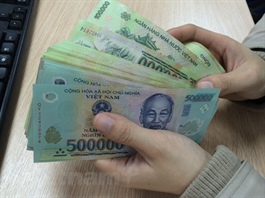Mobile money in line to protect remittances
Mobile money in line to protect remittances
Although global remittances are expected to see a sharp decline as the coronavirus-induced crisis continues to drag on the whole economy, Vietnam’s remittance flow is predicted to see a better outlook as overseas citizens send money back home to their relatives, particularly in the context of the upcoming adoption of mobile money services.

Mobile money in line to protect remittances
|
A recent report published by the World Bank’s Migration and Development Brief shows that if the ongoing health and economic crisis continues to spread, the amount of money migrant workers could send home globally is projected to drop 14 per cent by 2021 compared to the pre-pandemic levels in 2019.
Remittance flows to low and middle-income countries are projected to fall by 7 per cent, to $508 billion by the end of 2020, followed by a further decline of 7.5 per cent, to $470 billion in 2021. The foremost factors driving this decline include weak economic growth and employment levels in migrant-hosting countries, as well as weak oil prices and depreciation of the currencies of source countries against the US dollar.
“In low and middle-income countries, this source of money plays an important role in supporting hunger eradication and poverty reduction. But as incomes in developed countries fell due to the pandemic, it affected these sources for relatives at home,” said economist Can Van Luc.
David Malpass, president of the World Bank Group said, “The economic recession as a result of COVID-19 is seriously affecting migrant workers sending money home. Therefore, economic recovery in developed countries becomes even more important.”
Commenting on the amount of remittances going through the bank, a senior leader of the Overseas Remittance Department at Agribank Operation Centre, a subsidiary of state-owned lender Agribank noted, “Needless to say, remittances are falling sharply.”
Last year, Vietnamese workers living abroad sent home approximately $16.8 billion, making Vietnam the world’s ninth-biggest remittance beneficiary. Over the past few years, remittances sent to the country have grown by 10-15 per cent annually.
The amount of remittance is equivalent to 6.5 per cent of Vietnam’s GDP, showing that remittances continue to be an important asset for the country.
Germany’s database company Statista also estimated Vietnam’s remittance e-market stood at $22 million in 2019, and it is anticipated that the annual growth will reach 21.5 per cent from 2020 to 2023, resulting in $47 million in 2023.
However, Nguyen Minh Cuong, principal country economist from the Asian Development Bank, said that remittances are expected to decrease by 18 per cent in 2020.
“This decline comes from the Vietnamese community living and working abroad whose income is reduced due to stagnating economic growth in their host countries,” he explained.
Data from the State Bank of Vietnam (SBV) revealed that for the first half of 2020, remittance flows reached approximately $5.1 billion, about 10 per cent less than in the previous year.
Nguyen Hoang Minh, deputy director of the SBV’s Ho Chi Minh City branch revealed, “Remittances to Ho Chi Minh City decreased sharply in April and May, but started to recover from June and increased rapidly again in July and August. As of August 31, remittances throughout the city reached about $3 billion, equivalent to the same period last year. Hence, if there is a reduction, it is only about 1 per cent this year.”
Huynh Ngoc Huy, chairman of LienVietPostBank’s Board of Directors, said that this year the pandemic “has been affecting the amount of remittances flowing into Vietnam, but in the medium and long term, they have many opportunities to rise again.”
According to the World Bank’s Remittance Prices Worldwide Database, the global average cost of sending $200 was 6.8 per cent in the third quarter this year, largely unchanged since the first quarter of 2019, which nonetheless is still double the amount of the Sustainable Development Goals target of 3 per cent by 2030. The cost was the lowest in South Asia (5 per cent) and highest in Sub-Saharan Africa (8.5 per cent).
On the other hand, banks are the costliest channel for sending remittances, averaging at 10.9 per cent, followed by post offices at 8.6 per cent, money transfer operators at 5.8 per cent, and mobile operators at 2.8 per cent.
Philip Ziter, lawyer of the US-backed consultancy Russin & Vecchi branch in Ho Chi Minh City, said, “Using banks affords a high level of trust, but the costs are also high. Exchange rate losses and processing fees total on average 9 per cent of the transfer value. Using banks to remit is not always an option for largely unbanked populations in developing nations like Vietnam.”
Notwithstanding, forthcoming adoption of mobile money backed by Vietnamese regulators and local providers is expected to facilitate international remittances in a safe and responsible manner, while reducing the risks of money laundering and terrorism financing.
Elsewhere, traditional money transfer operators are also working with mobile money providers. For instance, Western Union is cooperating with Tigo Money to provide fast, convenient, and seamless services for a number of Latin American countries. Bangladesh-based bKash mobile money is also collaborating with Mastercard to deliver remittance services.
In Vietnam, the two state-owned technology giants of VNPT and Viettel have been licensed by the SBV to implement mobile money services.





















